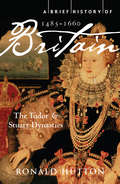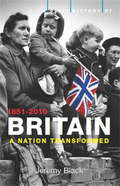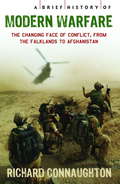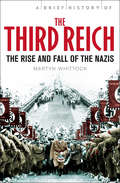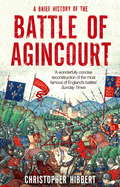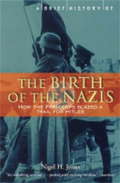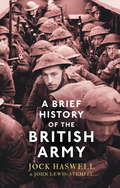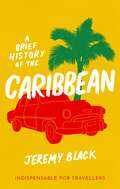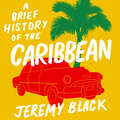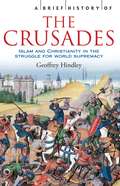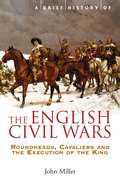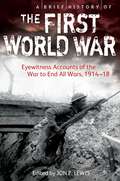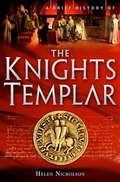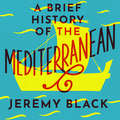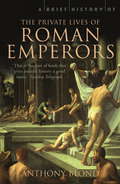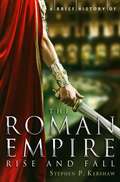- Table View
- List View
A Brief History of Britain 1485-1660: The Tudor and Stuart Dynasties (Brief Histories)
by Professor Ronald HuttonPraise for the author::'For anyone researching the subject, this is the book you've been waiting for.'Washington PostFrom the death of Richard III on Bosworth Field in 1485 to the execution of Charles I after the Civil Wars of 1642-48, England was transformed by two dynasties.First, the Tudors, who had won the crown on the battlefield, changed both the nature of kingship and the nation itself. England became Protestant and began to establish itself as a trading power; facing down seemingly impossible odds, it defeated its enemies on land and sea. But after a century, Elizabeth I died with no heir and the crown was passed to the Stuarts, who sought to remould the kingdom in their own image.Leading authority on the history of the British Isles in the sixteenth and seventeenth centuries, Ronald Hutton brilliantly recreates the political landscape of this early modern period and shows how the modern nation was forged in these febrile, transformative years. Combining skilful pen portraits of the leading figures of the day with descriptions of its culture, economics and vivid accounts of everyday life, Hutton provides telling insights into this critical period on Britain's national history.This the second book in the landmark four-volume Brief History of Britain which brings together leading historians to tell Britain's story, from the Norman Conquest of 1066 to the present day. Combining the latest research with accessible and entertaining story-telling, the series is the ideal introduction for students and general readers.
A Brief History of Britain 1851-2021: From World Power to ? (Brief Histories)
by Jeremy BlackFrom the Great Exhibition's showcasing of British national achievement in 1851 to the opening ceremonies of the Olympics in Stratford in 2012 and on to Brexit, an insightful exploration of the transformation of modern BritainThis revised and updated fourth and final volume in the concise Brief History of Britain series begins in the specially-constructed Crystal Palace, three times the length of St Paul's Cathedral, in Hyde Park at the beginning of the second half of the nineteenth century. The Great Exhibition it housed marked a high point of British national achievement, at the forefront of the Industrial Revolution, at the heart of a great empire, with Queen Victoria still to reign for fifty years. It was a time of confidence in the future, and exuberant patriotism for Britain's role in it.The beginning of the Second World War in 1939 marks a turning point because of the great change it heralded in Britain's global standing. At its peak, protected by the world's greatest navy, the British Empire stretched from Australasia to Canada, from Hong Kong and India to South Africa, and from Jamaica to the Falklands. Now the empire is no more: a fundamental change not only for the world, but also for Britain. The Second World War had been won, but it had exhausted Britain and marked the beginning of its national decline.Black links cultural and political developments closely - transport, health, migration and economic and demographic factors - in order to make clear how porous and changeable the manifestations of national civilisation can be, and to make sense of themes such as the triumph of town over country, Britain's international clout and the shift from the dominance of the market at the turn of the nineteenth century to the growing significance of the state. Importantly, he also looks at how public history has presented the nation's past, and how the changing and different ways we look at that past are central aspects of our shared history.
A Brief History of Modern Warfare: The changing face of conflict, from the Falklands to Afghanistan
by Richard ConnaughtonSince Vietnam, both the way we fight and our reasons for going to war have become much more complex.The importance of a conflict is determined not by its size or by the numbers of combatants involved but by its ripple effects and its influence upon future events. In a series of thrilling recreations of eight of the most significant encounters of the last three decades, military historian Richard Connaughton presents a fascinating insight into modern warfare, including interviews with some of the major figures. The conflicts include Goose Green in the Falklands, the invasion of Grenada, Operation Desert Storm - the first Iraq War, Operations in Mogadishu as immortalized in the book and film Blackhawk Down, the Siege of Gorazde and Operation Barras in Sierra Leone, as well as more recent events at Fallujah, Iraq, and in Helmand Province, Afghanistan. Richard Connaughton has interviewed most of the major figures involved in each of the conflicts and offers powerful insights into why battles either work or don't. This book will tell you what warfare means in the contemporary world and how it can affect tomorrow.
A Brief History of Modern Warfare: The changing face of conflict, from the Falklands to Afghanistan (Brief Histories)
by Richard ConnaughtonSince Vietnam, both the way we fight and our reasons for going to war have become much more complex.The importance of a conflict is determined not by its size or by the numbers of combatants involved but by its ripple effects and its influence upon future events. In a series of thrilling recreations of eight of the most significant encounters of the last three decades, military historian Richard Connaughton presents a fascinating insight into modern warfare, including interviews with some of the major figures. The conflicts include Goose Green in the Falklands, the invasion of Grenada, Operation Desert Storm - the first Iraq War, Operations in Mogadishu as immortalized in the book and film Blackhawk Down, the Siege of Gorazde and Operation Barras in Sierra Leone, as well as more recent events at Fallujah, Iraq, and in Helmand Province, Afghanistan. Richard Connaughton has interviewed most of the major figures involved in each of the conflicts and offers powerful insights into why battles either work or don't. This book will tell you what warfare means in the contemporary world and how it can affect tomorrow.
A Brief History of The Third Reich: The Rise And Fall Of The Nazis (Brief Histories )
by Martyn WhittockBeginning in the broken aftermath of the First World War and the Treaty of Versailles that made German recovery almost impossible, Whittock tells not just the account of the men who rose to the fore in the dangerous days of the Weimar republic, circling around the cult of personality generated by Adolf Hitler, but also a convincing and personality-driven overview of how ordinary Germans became seduced by the dreams of a new world order, the Third Reich. The book also gives a fascinating insight into the everyday life in Germany during the Second World War and explores key questions such as how much did the Germans know about the Holocaust and why did the regime eventually fail so disastrously?
A Brief History of The Third Reich: The Rise and Fall of the Nazis (Brief Histories)
by Martyn WhittockThe abuse of power, genocide, the destruction of total war, unimaginable cruelty and the suffering of millions were all central features of Hitler's Nazi regime. Yet the Nazis were also highly successful in manipulating images and information: they mobilized and engaged vast numbers of people, caught the imagination of the young and appeared remarkably modern to many contemporary observers.Was the Third Reich a throwback to a mythical past or a brutally modern and technologically advanced state? Was Hitler a strong dictator who achieved his clear goals, or was his chaotic style of government symptomatic of a weak dictator, unable to control the complex and contradictory forces that he had unleashed? Was the Third Reich ruled by terror, or largely supported by a compliant German population? Was the genocide against the Jews a peculiarly German phenomenon, or a uniquely German expression of a terrible wider trend?Whittock explores these and other key questions, interrogating the views of different historians and drawing on a wealth of primary sources - from state-sponsored art to diaries, letters and memoirs of both perpetrators and victims - to provide an overview of the complex evidence. History should aim to put us firmly in touch with the lives of people living in the past and the issues they faced. Whittock never loses sight of the individuals whose lives were caught up in these extraordinary events, while also giving a lucid overview of the bigger picture.
A Brief History of the Battle of Agincourt
by Christopher HibbertThere can be few military victories so complete, or achieved against such heavy odds, as that won by Henry V on 25 October 1415 against Charles VI's army at Agincourt. In the words of one contemporary French chronicler, it was the 'most disgraceful event that had ever happened to the Kingdom of France'.Christopher Hibbert's wonderfully concise account draws on the unusual number of contemporary sources available to historians to describe in lucid detail not only what happened, but how it happened. His classic account of the crushing defeat of the French at Agincourt combines historical rigour with a vigorous and very readable narrative style.
A Brief History of the Battle of Agincourt (Brief Histories)
by Christopher HibbertThere can be few military victories so complete, or achieved against such heavy odds, as that won by Henry V on 25 October 1415 against Charles VI's army at Agincourt. In the words of one contemporary French chronicler, it was the 'most disgraceful event that had ever happened to the Kingdom of France'.Christopher Hibbert's wonderfully concise account draws on the unusual number of contemporary sources available to historians to describe in lucid detail not only what happened, but how it happened. His classic account of the crushing defeat of the French at Agincourt combines historical rigour with a vigorous and very readable narrative style.
A Brief History of the Birth of the Nazis
by Nigel JonesThe birth pangs of Nazism grew out of the death agony of the Kaiser's Germany. Defeat in World War I and a narrow escape from Communist revolution brought not peace but five chaotic years (1918-1923) of civil war, assassination, plots, putsches and murderous mayhem to Germany. The savage world of the trenches came home with the men who refused to admit defeat and 'who could not get the war out of their system'. It was an atmosphere in which civilised values withered, and violent extremism flourished. In this chronicle of the paramilitary Freikorps - the freebooting armies that crushed the Red revolution, then themselves attempted to take over by armed force - historian and biographer Nigel Jones draws on little-known archives in Germany and Britain to paint a portrait of a state torn between revolution and counter revolution. Astonishingly, this is the first in-depth study of the Freikorps to appear in English for 50 years. Yet the figures who flit through its shadowy world - men like Röhm, Goering and Hitler himself - were to become frighteningly familiar just ten years after the turmoil that gave Nazism its fatal chance.
A Brief History of the British Army
by John Lewis-Stempel Jock HaswellThe story of the British Army has many sides to it, being a tale of heroic successes and tragic failures, of dogged determination and drunken disorder. It involves many of the most vital preoccupations in the history of the island - the struggle against Continental domination by a single power, the battle for Empire - and a cast pf remarkable characters - Marlborough, Wellington and Montgomery among them. Yet the British, relying on their navy, have always neglected their army; from the time of Alfred the Great to the reign of Charles II wars were fought with hired forces disbanded as soon as conflict ended. Even after the stuggles with Louis XIV impelled the formation of a reulgar army, impecunious governments neglected the armed forces except in times of national emergency. In this wide-ranging account, Major Haswell sketches the medieval background before concentrating on the three hundred years of the regular army, leading up to its role in our own time. He presents an informed and probing picture of the organization of the army, the development of weaponry and strategy - and the everyday life of the British soldier through the centuries.John Lewis-Stempel has brought Major Haswell's classic work right up to date by expanding the section on the dissolution of empire to include a full account of Northern Ireland and the Falklands War. He has added a new chapter to cover the Gulf War, Bosnia, Afghanistan and Iraq; also the increasing role of special forces and the amalgamation of regiments.
A Brief History of the British Army (Brief Histories)
by John Lewis-Stempel Major Jock HaswellThe story of the British Army has many sides to it, being a tale of heroic successes and tragic failures, of dogged determination and drunken disorder. It involves many of the most vital preoccupations in the history of the island - the struggle against Continental domination by a single power, the battle for Empire - and a cast pf remarkable characters - Marlborough, Wellington and Montgomery among them. Yet the British, relying on their navy, have always neglected their army; from the time of Alfred the Great to the reign of Charles II wars were fought with hired forces disbanded as soon as conflict ended. Even after the stuggles with Louis XIV impelled the formation of a reulgar army, impecunious governments neglected the armed forces except in times of national emergency. In this wide-ranging account, Major Haswell sketches the medieval background before concentrating on the three hundred years of the regular army, leading up to its role in our own time. He presents an informed and probing picture of the organization of the army, the development of weaponry and strategy - and the everyday life of the British soldier through the centuries.John Lewis-Stempel has brought Major Haswell's classic work right up to date by expanding the section on the dissolution of empire to include a full account of Northern Ireland and the Falklands War. He has added a new chapter to cover the Gulf War, Bosnia, Afghanistan and Iraq; also the increasing role of special forces and the amalgamation of regiments.
A Brief History of the Caribbean: Indispensable for Travellers (Brief Histories)
by Jeremy BlackA concise history of the Caribbean's long and fascinating history, from pre-contact civilisations to the present day This is a concise history, intended for travellers, but of inestimable value to anyone looking for an overview of the Caribbean and its mainland coastal states, with a focus on the past few centuries. The history of the Caribbean does not make much sense without factoring in the cities - Pensacola, New Orleans, Galveston - and the ambitions of the states on its continental shores, notably the United States. This account is grounded in a look at the currents and channels of the sea, and its constraints, such as the Mosquito Coast, followed by the history of 'pre-contact' civilisations, focusing on the Maya and the Toltec Empire.With the arrival of the Europeans, from the late fifteenth century to the early years of the seventeenth century, the story becomes one of exploration, conquest and settlement. Black charts the rise of slave economies and the Caribbean's place in the Atlantic world, also the arrival of the English - Hawkins and Drake - to challenge the Spanish. He examines the sugar and coffee slave economies of the English, French, Spanish and Dutch, also the successful rebellion in Haiti in the eighteenth century, and how the West Indies were further transformed by the Louisiana Purchase, the American conquest of Florida and the incorporation of Texas.He discusses the impact of Bolivar's rebellion in Spanish America, the end of slavery in the British Caribbean, and war between Mexico and America; also the defeat of the South by the Union, the American takeover of the Panama Canal project from France, and the Spanish-American War.The first half of the twentieth century focuses on growing US power: intervention in Mexico, Honduras, Nicaragua, Panama, Haiti and the Dominican Republic; Cuba as an American protectorate, and civil wars in Mexico.The Cold War brought new tensions and conflict to the region, but the same period also saw the rise of the leisure industry. The last part of the book looks at the Caribbean today - political instability in Venezuela and Colombia, crime in Mexico, post-Castro Cuba - and the region's future prospects.
A Brief History of the Caribbean: Indispensable for Travellers (Brief Histories)
by Jeremy BlackA concise history of the Caribbean's long and fascinating history, from pre-contact civilisations to the present day This is a concise history, intended for travellers, but of inestimable value to anyone looking for an overview of the Caribbean and its mainland coastal states, with a focus on the past few centuries. The history of the Caribbean does not make much sense without factoring in the cities - Pensacola, New Orleans, Galveston - and the ambitions of the states on its continental shores, notably the United States. This account is grounded in a look at the currents and channels of the sea, and its constraints, such as the Mosquito Coast, followed by the history of 'pre-contact' civilisations, focusing on the Maya and the Toltec Empire.With the arrival of the Europeans, from the late fifteenth century to the early years of the seventeenth century, the story becomes one of exploration, conquest and settlement. Black charts the rise of slave economies and the Caribbean's place in the Atlantic world, also the arrival of the English - Hawkins and Drake - to challenge the Spanish. He examines the sugar and coffee slave economies of the English, French, Spanish and Dutch, also the successful rebellion in Haiti in the eighteenth century, and how the West Indies were further transformed by the Louisiana Purchase, the American conquest of Florida and the incorporation of Texas.He discusses the impact of Bolivar's rebellion in Spanish America, the end of slavery in the British Caribbean, and war between Mexico and America; also the defeat of the South by the Union, the American takeover of the Panama Canal project from France, and the Spanish-American War.The first half of the twentieth century focuses on growing US power: intervention in Mexico, Honduras, Nicaragua, Panama, Haiti and the Dominican Republic; Cuba as an American protectorate, and civil wars in Mexico.The Cold War brought new tensions and conflict to the region, but the same period also saw the rise of the leisure industry. The last part of the book looks at the Caribbean today - political instability in Venezuela and Colombia, crime in Mexico, post-Castro Cuba - and the region's future prospects.
A Brief History of the Caribbean: Indispensable for Travellers (Brief Histories)
by Jeremy BlackA concise history of the Caribbean's long and fascinating history, from pre-contact civilisations to the present day This is a concise history, intended for travellers, but of inestimable value to anyone looking for an overview of the Caribbean and its mainland coastal states, with a focus on the past few centuries. The history of the Caribbean does not make much sense without factoring in the cities - Pensacola, New Orleans, Galveston - and the ambitions of the states on its continental shores, notably the United States. This account is grounded in a look at the currents and channels of the sea, and its constraints, such as the Mosquito Coast, followed by the history of 'pre-contact' civilisations, focusing on the Maya and the Toltec Empire.With the arrival of the Europeans, from the late fifteenth century to the early years of the seventeenth century, the story becomes one of exploration, conquest and settlement. Black charts the rise of slave economies and the Caribbean's place in the Atlantic world, also the arrival of the English - Hawkins and Drake - to challenge the Spanish. He examines the sugar and coffee slave economies of the English, French, Spanish and Dutch, also the successful rebellion in Haiti in the eighteenth century, and how the West Indies were further transformed by the Louisiana Purchase, the American conquest of Florida and the incorporation of Texas.He discusses the impact of Bolivar's rebellion in Spanish America, the end of slavery in the British Caribbean, and war between Mexico and America; also the defeat of the South by the Union, the American takeover of the Panama Canal project from France, and the Spanish-American War.The first half of the twentieth century focuses on growing US power: intervention in Mexico, Honduras, Nicaragua, Panama, Haiti and the Dominican Republic; Cuba as an American protectorate, and civil wars in Mexico.The Cold War brought new tensions and conflict to the region, but the same period also saw the rise of the leisure industry. The last part of the book looks at the Caribbean today - political instability in Venezuela and Colombia, crime in Mexico, post-Castro Cuba - and the region's future prospects.
A Brief History of the Crusades
by Geoffrey HindleyWhy did the medieval Church bless William of Normandy's invasion of Christian England in 1066 and authorise cultural genocide in Provence? How could a Christian army sack Christian Constantinople in 1204? Why did thousands of ordinary men and women, led by knights and ladies, kings and queens, embark on campaigns of fanatical conquest in the world of Islam? The word 'Crusade' came later, but the concept of a 'war for the faith' is an ancient one. Geoffrey Hindley instructively unravels the story of the Christian military expeditions that have perturbed European history, troubled Christian consciences and embittered Muslim attitudes towards the West. He offers a lively record of the Crusades, from the Middle East to the pagan Baltic, and fascinating portraits of the major personalities, from Godfrey of Bouillon, the first Latin ruler of Jerusalem, to Etienne, the visionary French peasant boy who inspired the tragic Children's Crusade. Addressing questions rarely considered, Hindley sheds new light on pressing issues surrounding religious division and shows how the Crusades have helped to shape the modern world and relations between Christian and Muslim countries to this day.
A Brief History of the Crusades (Brief Histories)
by Geoffrey HindleyWhy did the medieval Church bless William of Normandy's invasion of Christian England in 1066 and authorise cultural genocide in Provence? How could a Christian army sack Christian Constantinople in 1204? Why did thousands of ordinary men and women, led by knights and ladies, kings and queens, embark on campaigns of fanatical conquest in the world of Islam? The word 'Crusade' came later, but the concept of a 'war for the faith' is an ancient one. Geoffrey Hindley instructively unravels the story of the Christian military expeditions that have perturbed European history, troubled Christian consciences and embittered Muslim attitudes towards the West. He offers a lively record of the Crusades, from the Middle East to the pagan Baltic, and fascinating portraits of the major personalities, from Godfrey of Bouillon, the first Latin ruler of Jerusalem, to Etienne, the visionary French peasant boy who inspired the tragic Children's Crusade. Addressing questions rarely considered, Hindley sheds new light on pressing issues surrounding religious division and shows how the Crusades have helped to shape the modern world and relations between Christian and Muslim countries to this day.
A Brief History of the English Civil Wars: Roundheads, Cavaliers and the Execution of the King (Brief Histories)
by Professor John MillerMiller provides a clear and comprehensible narrative, a coherent and accurate synthesis, intended as a guide for students and the general reader to an extremely complex period in British history. His aim is to help readers avoid getting lost in a maze of detail and rather to maintain a grasp of the big picture. Although the English Civil War is usually seen, in England at least, as a conflict between two sides, it involved the Scots, the Irish and the army and the people of England, especially London. At some points, events occurred and perspectives changed with such disorienting rapidity that even those who lived through these events were confused as to where they stood in relation to one another.As the 1640s wore on, events unfolded in ways which the participants had not expected and in many cases did not want. Hindsight might suggest that everything led logically to the trial and execution of the king, but these were in fact highly improbable outcomes.Since the 1980s, a 'three kingdoms' approach has become almost compulsory, but Miller's focus is unashamedly on England. Events in Scotland and Ireland are covered only insofar as they had an impact on events in England.
A Brief History of the First World War: Eyewitness Accounts of the War to End All Wars, 1914-18
by Jon E. LewisEven 100 years on from the First World War it haunts us still. No other conflict has revealed so dramatically the senselessness of war, and none has shaped the modern world to the same extent, from its impact on the Russian Revolution and the rise of Hitler to the final break-up of the British Empire and the supremacy of America. These compelling eyewitness accounts - over 180 of them - of the War to End All Wars cover every facet of the war, from the Flanders trenches to the staffrooms of the Imperial German Army, from T. E. Lawrence ('Lawrence of Arabia') in the desert to German figher ace the Red Baron in the air, and from English Land Girls to German U-boat crews in the North Atlantic. There are contributions from all combatant nations, including the UK, USA, France, Germany, Canada, Italy, Australia, Russia, Serbia, and India and the book includes a detailed timeline and maps.
A Brief History of the First World War: Eyewitness Accounts of the War to End All Wars, 1914–18 (Brief Histories)
by Jon E. LewisEven 100 years on from the First World War it haunts us still. No other conflict has revealed so dramatically the senselessness of war, and none has shaped the modern world to the same extent, from its impact on the Russian Revolution and the rise of Hitler to the final break-up of the British Empire and the supremacy of America. These compelling eyewitness accounts - over 180 of them - of the War to End All Wars cover every facet of the war, from the Flanders trenches to the staffrooms of the Imperial German Army, from T. E. Lawrence ('Lawrence of Arabia') in the desert to German figher ace the Red Baron in the air, and from English Land Girls to German U-boat crews in the North Atlantic. There are contributions from all combatant nations, including the UK, USA, France, Germany, Canada, Italy, Australia, Russia, Serbia, and India and the book includes a detailed timeline and maps.
A Brief History of the Knights Templar: The Trial Of The Templars In The British Isles, 1308-1311 (Brief Histories)
by Professor in Med Helen NicholsonMuch has been written about the Knights Templar in recent years. A leading specialist in the history of this legendary medieval order now writes a full account of the Knights of the Order of the Temple of Solomon, to give them their full title, bringing the latest findings to a general audience. Putting many of the myths finally to rest, Nicholson recounts a new history of these storm troopers of the papacy, founded during the crusades but who got so rich and influential that they challenged the power of kings.
A Brief History of the Mediterranean: Indispensable for Travellers
by Jeremy BlackA wonderfully concise and readable, yet comprehensive, history of the Mediterranean Sea, the perfect companion for any visitor -- or indeed, anyone compelled to stay at home.'The grand object of travelling is to see the shores of the Mediterranean.'Samuel Johnson, 1776The Mediterranean has always been a leading stage for world history; it is also visited each year by tens of millions of tourists, both local and international. Jeremy Black provides an account in which the experience of travel is foremost: travel for tourism, for trade, for war, for migration, for culture, or, as so often, for a variety of reasons. Travellers have always had a variety of goals and situations, from rulers to slaves, merchants to pirates, and Black covers them all, from Phoenicians travelling for trade to the modern tourist sailing for pleasure and cruising in great comfort.Throughout the book the emphasis is on the sea, on coastal regions and on port cities visited by cruise liners - Athens, Barcelona, Naples, Palermo. But it also looks beyond, notably to the other waters that flow into the Mediterranean - the Black Sea, the Atlantic, the Red Sea and rivers, from the Ebro and Rhone to the Nile. Much of western Eurasia and northern Africa played, and continues to play, a role, directly or indirectly, in the fate of the Mediterranean. At times, that can make the history of the sea an account of conflict after conflict, but it is necessary to understand these wars in order to grasp the changing boundaries of the Mediterranean states, societies and religions, the buildings that have been left, and the peoples' cultures, senses of identity and histories.Black explores the centrality of the Mediterranean to the Western experience of travel, beginning in antiquity with the Phoenicians, Minoans and Greeks. He shows how the Roman Empire united the sea, and how it was later divided by Christianity and Islam. He tells the story of the rise and fall of the maritime empires of Pisa, Genoa and Venice, describes how galley warfare evolved and how the Mediterranean fired the imagination of Shakespeare, among many artists. From the Renaissance and Baroque to the seventeenth-century beginnings of English tourism - to the Aegean, Sicily and other destinations - Black examines the culture of the Mediterraean. He shows how English naval power grew, culminating in Nelson's famous victory over the French in the Battle of the Nile and the establishment of Gibraltar, Minorca and Malta as naval bases. Black explains the retreat of Islam in north Africa, describes the age of steam navigation and looks at how and why the British occupied Cyprus, Egypt and the Ionian Islands. He looks at the impact of the Suez Canal as a new sea route to India and how the Riviera became Europe's playground. He shows how the Mediterranean has been central to two World Wars, the Cold War and ongoing conflicts in the Middle East. With its focus always on the Sea, the book looks at the fate of port cities particularly - Alexandria, Salonika and Naples.
A Brief History of the Mediterranean: Indispensable for Travellers
by Jeremy BlackA wonderfully concise and readable, yet comprehensive, history of the Mediterranean Sea, the perfect companion for any visitor -- or indeed, anyone compelled to stay at home.'The grand object of travelling is to see the shores of the Mediterranean.'Samuel Johnson, 1776The Mediterranean has always been a leading stage for world history; it is also visited each year by tens of millions of tourists, both local and international. Jeremy Black provides an account in which the experience of travel is foremost: travel for tourism, for trade, for war, for migration, for culture, or, as so often, for a variety of reasons. Travellers have always had a variety of goals and situations, from rulers to slaves, merchants to pirates, and Black covers them all, from Phoenicians travelling for trade to the modern tourist sailing for pleasure and cruising in great comfort.Throughout the book the emphasis is on the sea, on coastal regions and on port cities visited by cruise liners - Athens, Barcelona, Naples, Palermo. But it also looks beyond, notably to the other waters that flow into the Mediterranean - the Black Sea, the Atlantic, the Red Sea and rivers, from the Ebro and Rhone to the Nile. Much of western Eurasia and northern Africa played, and continues to play, a role, directly or indirectly, in the fate of the Mediterranean. At times, that can make the history of the sea an account of conflict after conflict, but it is necessary to understand these wars in order to grasp the changing boundaries of the Mediterranean states, societies and religions, the buildings that have been left, and the peoples' cultures, senses of identity and histories.Black explores the centrality of the Mediterranean to the Western experience of travel, beginning in antiquity with the Phoenicians, Minoans and Greeks. He shows how the Roman Empire united the sea, and how it was later divided by Christianity and Islam. He tells the story of the rise and fall of the maritime empires of Pisa, Genoa and Venice, describes how galley warfare evolved and how the Mediterranean fired the imagination of Shakespeare, among many artists. From the Renaissance and Baroque to the seventeenth-century beginnings of English tourism - to the Aegean, Sicily and other destinations - Black examines the culture of the Mediterraean. He shows how English naval power grew, culminating in Nelson's famous victory over the French in the Battle of the Nile and the establishment of Gibraltar, Minorca and Malta as naval bases. Black explains the retreat of Islam in north Africa, describes the age of steam navigation and looks at how and why the British occupied Cyprus, Egypt and the Ionian Islands. He looks at the impact of the Suez Canal as a new sea route to India and how the Riviera became Europe's playground. He shows how the Mediterranean has been central to two World Wars, the Cold War and ongoing conflicts in the Middle East. With its focus always on the Sea, the book looks at the fate of port cities particularly - Alexandria, Salonika and Naples.
A Brief History of the Mediterranean: Indispensable for Travellers
by Jeremy BlackA wonderfully concise and readable, yet comprehensive, history of the Mediterranean Sea, the perfect companion for any visitor -- or indeed, anyone compelled to stay at home.'The grand object of travelling is to see the shores of the Mediterranean.'Samuel Johnson, 1776The Mediterranean has always been a leading stage for world history; it is also visited each year by tens of millions of tourists, both local and international. Jeremy Black provides an account in which the experience of travel is foremost: travel for tourism, for trade, for war, for migration, for culture, or, as so often, for a variety of reasons. Travellers have always had a variety of goals and situations, from rulers to slaves, merchants to pirates, and Black covers them all, from Phoenicians travelling for trade to the modern tourist sailing for pleasure and cruising in great comfort.Throughout the book the emphasis is on the sea, on coastal regions and on port cities visited by cruise liners - Athens, Barcelona, Naples, Palermo. But it also looks beyond, notably to the other waters that flow into the Mediterranean - the Black Sea, the Atlantic, the Red Sea and rivers, from the Ebro and Rhone to the Nile. Much of western Eurasia and northern Africa played, and continues to play, a role, directly or indirectly, in the fate of the Mediterranean. At times, that can make the history of the sea an account of conflict after conflict, but it is necessary to understand these wars in order to grasp the changing boundaries of the Mediterranean states, societies and religions, the buildings that have been left, and the peoples' cultures, senses of identity and histories.Black explores the centrality of the Mediterranean to the Western experience of travel, beginning in antiquity with the Phoenicians, Minoans and Greeks. He shows how the Roman Empire united the sea, and how it was later divided by Christianity and Islam. He tells the story of the rise and fall of the maritime empires of Pisa, Genoa and Venice, describes how galley warfare evolved and how the Mediterranean fired the imagination of Shakespeare, among many artists. From the Renaissance and Baroque to the seventeenth-century beginnings of English tourism - to the Aegean, Sicily and other destinations - Black examines the culture of the Mediterraean. He shows how English naval power grew, culminating in Nelson's famous victory over the French in the Battle of the Nile and the establishment of Gibraltar, Minorca and Malta as naval bases. Black explains the retreat of Islam in north Africa, describes the age of steam navigation and looks at how and why the British occupied Cyprus, Egypt and the Ionian Islands. He looks at the impact of the Suez Canal as a new sea route to India and how the Riviera became Europe's playground. He shows how the Mediterranean has been central to two World Wars, the Cold War and ongoing conflicts in the Middle East. With its focus always on the Sea, the book looks at the fate of port cities particularly - Alexandria, Salonika and Naples.
A Brief History of the Private Lives of the Roman Emperors (Brief Histories)
by Anthony BlondWith the recent success of 'Rome' on BBC2, no one will look at the private lives of the Roman Emperors again in the same light. Anthony Blond's scandalous expose of the life of the Caesars is a must-read for all interested in what really went on in ancient Rome. Julius Caesar is usually presented as a glorious general when in fact he was an arrogant charmer and a swank; Augustus was so conscious of his height that he put lifts in his sandals.But they were nothing compared to Caligula, Claudius and Nero. This book is fascinating reading, eye-opening in its revelations and effortlessly entertaining.
A Brief History of the Roman Empire (Brief Histories)
by Dr Stephen P. KershawIn this lively and very readable history of the Roman Empire from its establishment in 27 BC to the barbarian incursions and the fall of Rome in AD 476, Kershaw draws on a range of evidence, from Juvenal's Satires to recent archaeological finds. He examines extraordinary personalities such as Caligula and Nero and seismic events such as the conquest of Britain and the establishment of a 'New Rome' at Constantinople and the split into eastern and western empires. Along the way we encounter gladiators and charioteers, senators and slaves, fascinating women, bizarre sexual practices and grotesque acts of brutality, often seen through eyes of some of the world's greatest writers. He concludes with a brief look at how Rome lives on in the contemporary world, in politics, architecture, art and literature.
